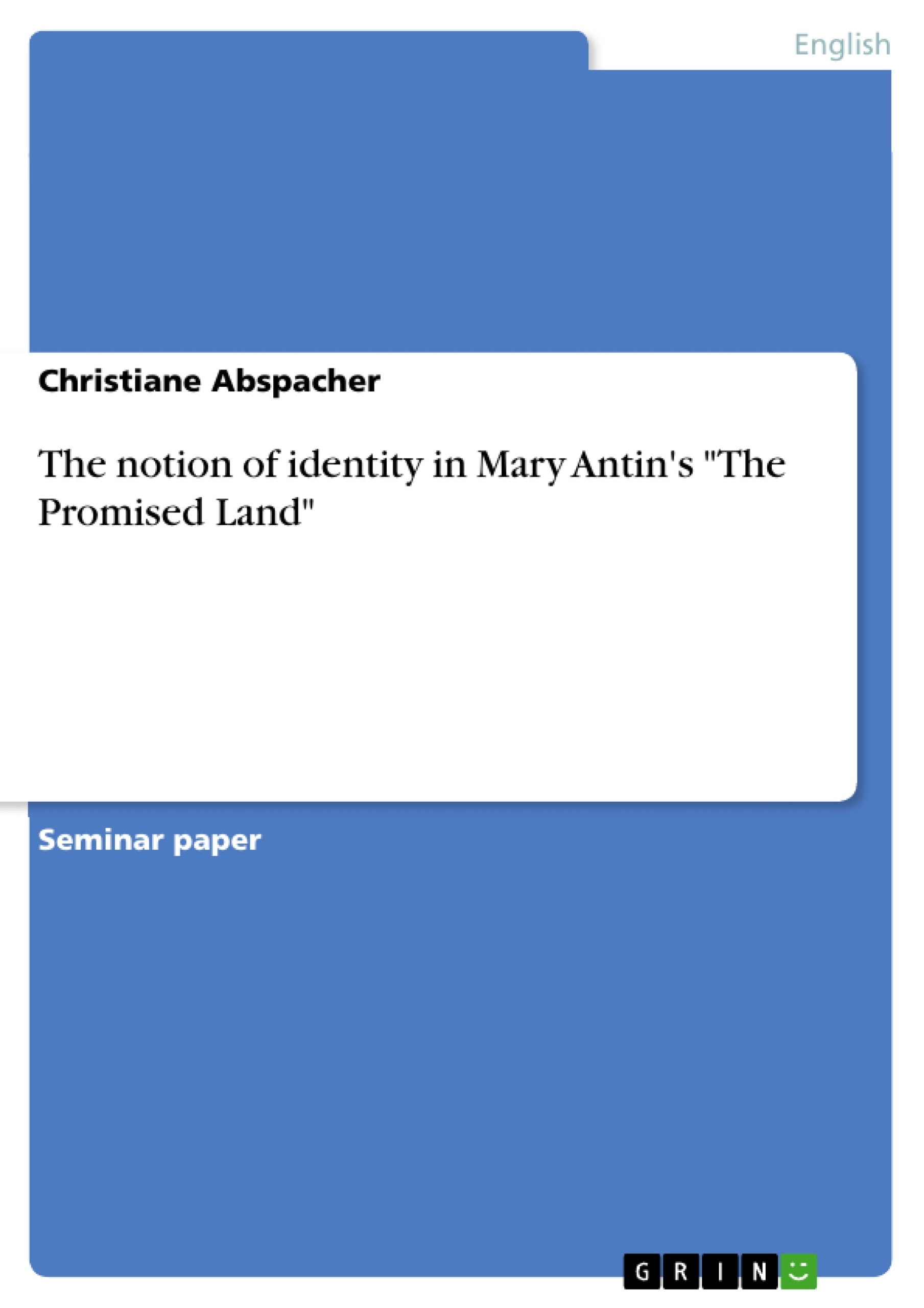In order to be able to grasp the dimension of the role identity plays in Mary Antin’s The Promised Land, one has to take into consideration the author’s biographical background, as the first part of her life differs completely from the later years. She is born in the Jewish Polotzk near Witebsk in White Russia. In 1894, the family emigrates to the United States. Mary receives solid school education and manages to have her first poem published in the Boston Herald at the age of fifteen. With the help of diligence, natural ability, curiousness and luck, Mary Antin advances from her proletarian neighbourhood to higher educated circles. Antin publishes several essays, short stories and poems, gives lectures and gets involved with the loosening of laws restricting immigration.
Already at the age of twenty, Mary Antin writes her autobiography The Promised Land (formerly published under the name of "From Polotzk to Boston"), which describes her childhood in Russia, her immigration to America, the initial problems in her new homeland and her success in gaining ground. Especially the preface causes attention, as she calls her life “unusual, but by no means unique. (…) [A] concrete illustration of a multitude of statistical facts”, while she is distancing herself from her former life as Maryashe Weltman in Polotzk. The high degree of self- reflexiveness and the dispartment of her own person into at least two identities predestine her book as a subject of inquiry by means of sociological investigation in the field of identity research.
In order to discuss Mary Antin’s notion of identity, it is required to outline the term itself. Within the last decades, this concept has become central to social science and it has turned from a technical term to an almost redundantly used catchphrase in virtually every field of everyday life. Thus, the perception of identity is as subjected to historical, social, political and emancipational changes as every other term referring to the self- reflexion of an individual, which also develops according to altering circumstances.
This essay tries to concretise the term "identity" in order to be able to grasp the difference between the "given identity" in Polotzk and the "hybrid, constructable identity" Mary Antin experiences in the United States.
Moreover, this essay will give possible reasons for Mary Antin's comprehensive closure with her past in Russia.
Table of Contents
- A short abstract of Mary Antin's biography:
- The notion of identity in Mary Antin's The Promised Land
- Disambiguation of “identity”
- Polotzk: Identity as a given attribute
- Boston: Identity as a hybrid construction
- Possible reasons for Mary Antin's exhaustive closing with her past
- Works of Reference
Objectives and Key Themes
Mary Antin's autobiography, *The Promised Land*, explores the complex journey of a young Jewish woman from Russia to America. The work offers a personal account of immigration, cultural assimilation, and the evolving nature of identity. Antin's narrative delves into the challenges and opportunities she encountered in her new homeland.
- The impact of immigration on personal identity.
- The role of culture and societal expectations in shaping self-perception.
- The construction of identity as a process of negotiation and adaptation.
- The intersection of ethnicity, religion, and national belonging.
- The transformative power of education and social mobility.
Chapter Summaries
The opening chapters of *The Promised Land* establish Antin's childhood in Polotzk, a Jewish Pale in White Russia. Antin vividly portrays the anti-Semitism she experienced and the sense of belonging she felt within her community. She describes her family's poverty and the limitations imposed upon Jews by the Tsarist regime. The narrative then shifts to the Antin's emigration to America, detailing their initial struggles in Boston and the challenges of adapting to a new culture.
Subsequent chapters explore Antin's journey from poverty to academic success. She highlights the transformative power of education and her relentless pursuit of knowledge. Antin's narrative also touches upon the social mobility she experienced, moving from her immigrant neighborhood to higher educated circles. Throughout these chapters, Antin's evolving understanding of identity and her negotiation of her Jewish and American identities are central themes.
Keywords
Key themes and concepts explored in *The Promised Land* include immigration, identity, cultural assimilation, anti-Semitism, social mobility, education, and the American Dream. The book sheds light on the subjective experience of navigating cultural differences and the personal transformation that accompanies migration.
Frequently Asked Questions
What is the central theme of Mary Antin's "The Promised Land"?
The autobiography explores the transformation of identity during immigration, specifically focusing on Mary Antin's journey from a Jewish community in Russia to her assimilation into American society.
How does Antin distinguish between her life in Polotzk and Boston?
She views her identity in Polotzk as a "given attribute" defined by poverty and anti-Semitism, while her identity in Boston is a "hybrid construction" shaped by choice, education, and social mobility.
What role does education play in Mary Antin's identity?
Education is described as a transformative power. It allowed Antin to move from her proletarian immigrant neighborhood to higher educated circles, enabling her to construct a new American identity.
Why does Mary Antin distance herself from her past as "Maryashe Weltman"?
Antin uses a high degree of self-reflexiveness to separate her current self from her past. This closure was necessary to fully embrace the opportunities of the "Promised Land" and leave behind the limitations of the Tsarist regime.
How is the concept of "identity" defined in this sociological investigation?
Identity is treated as a dynamic concept subject to historical, social, and political changes. It is presented as a process of negotiation and adaptation rather than a fixed state.
- Quote paper
- Christiane Abspacher (Author), 2006, The notion of identity in Mary Antin's "The Promised Land", Munich, GRIN Verlag, https://www.grin.com/document/57975



